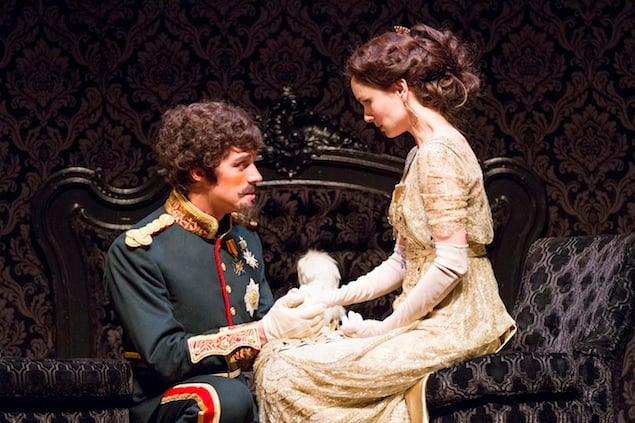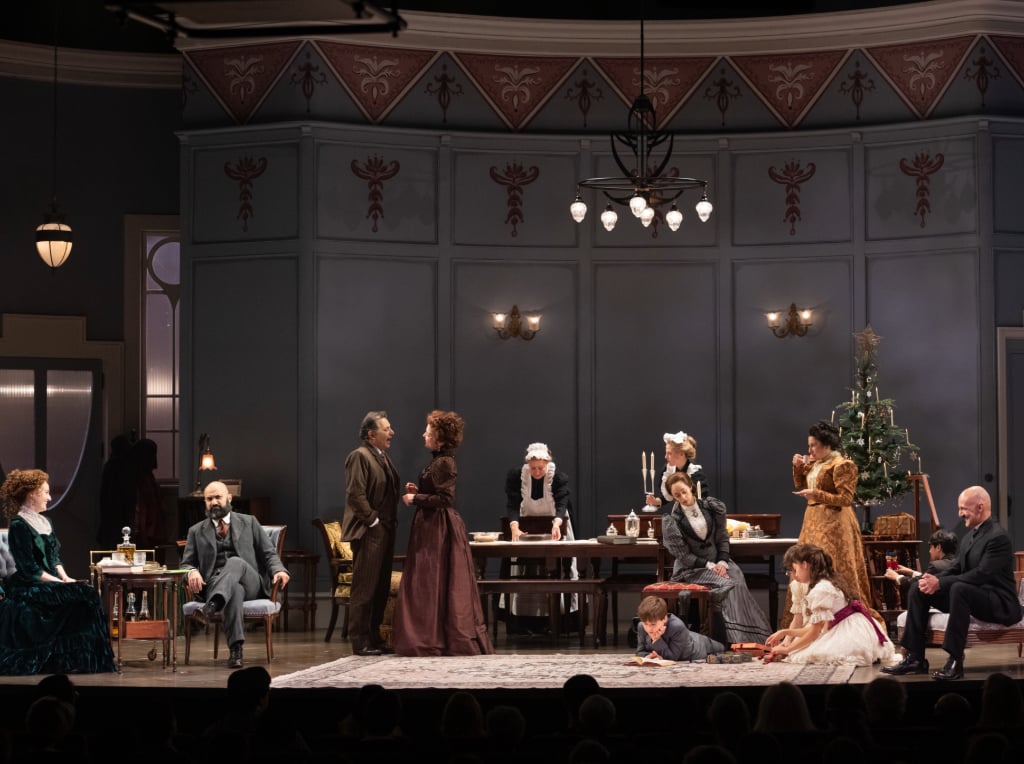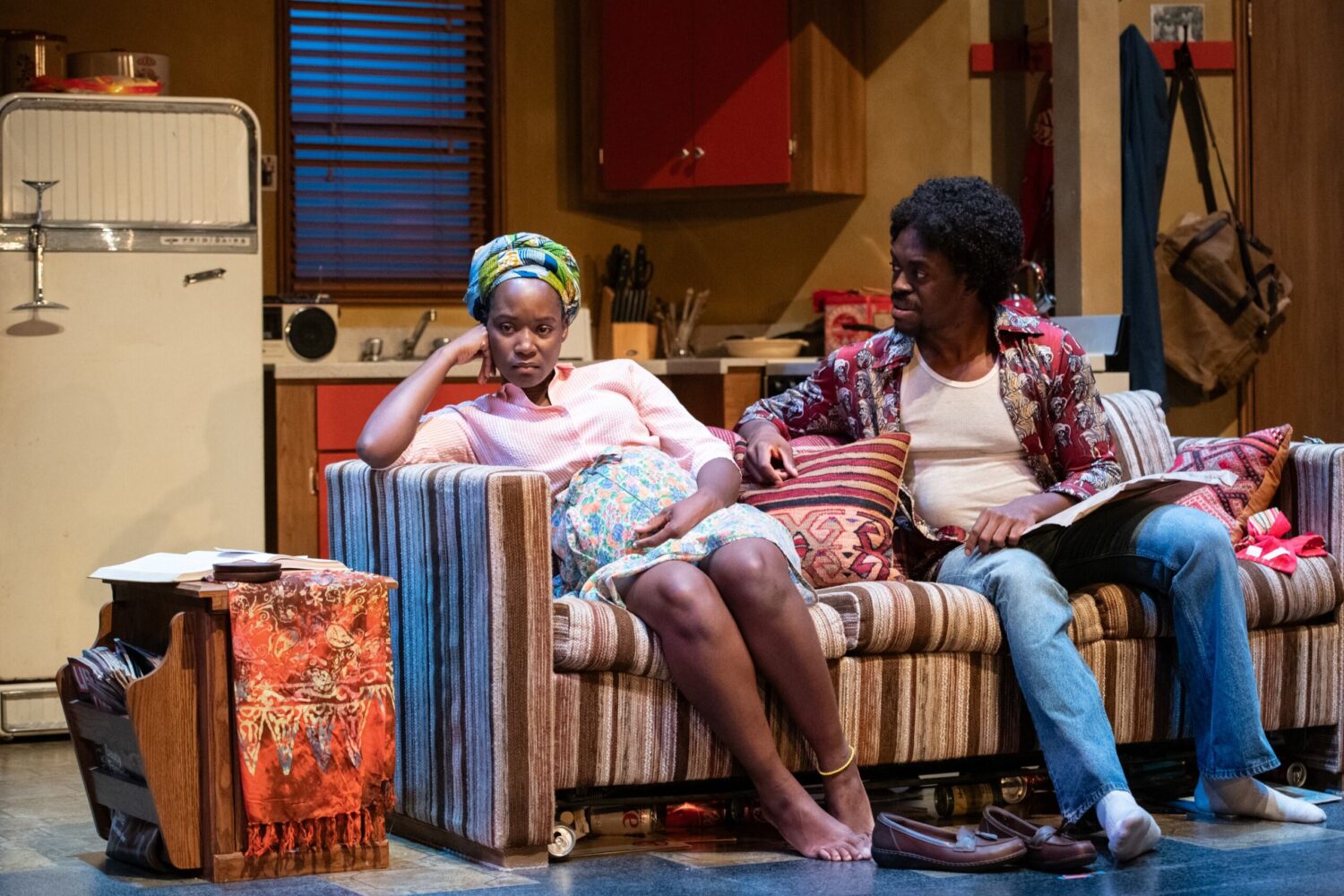
A little reimagining goes a long way in the Kennedy Center’s sparkling, emotionally mysterious new rendering of an old play, Ferenc Molnár’s 1910 comedy of marital misunderstanding, The Guardsman. If you’re a real theater buff, you’ll want to compare this show with Tom Stoppard’s The Real Thing at Studio Theatre. Each explores love and infidelity, but quite differently.
Playwright Richard Nelson’s new translation of Molnár’s text—it’s not billed as an “adaptation”—doesn’t “update” the story. It’s still a period piece, set in Budapest circa 1910. What’s different, as Nelson explains in his program notes, is that he’s shaken the fluff out of earlier English versions, one of which was a feathery vehicle for stage legends Alfred Lunt and Lynn Fontanne on Broadway (1924-25) and on film (1931). He and director Gregory Mosher mine the melancholy lurking in Molnár’s sophisticated comedy about marital strife. The show gets laughs while simultaneously plumbing depths.
The opening scene, though it’s very funny, also sounds like a seething Strindberg play about a marriage on the rocks. A pair of newlyweds, both stars of the Budapest stage and dubbed simply Actor (Finn Wittrock) and Actress (Sarah Wayne Callies), fight constantly. He’s convinced that after only six months she doesn’t love him any more, and she won’t deny it. He harangues; she weeps. Then a bill collector walks in, and instantly the couple—they’re actors, after all—shift into convivial giggles, buying him off with flattery and a couple of theater tickets. As soon as he goes, they rejoin the fight. Funny, yes, but also uncomfortably close to the bone in its depiction of how couples hide their private clashes from the world.
Director Mosher has not staged a door-slamming farce here. He leaves breathing room for his fine cast to show conflicting emotions and to live between the lines. The Guardsman stays with you as most farces do not, because of the feelings that hang in the air as the curtain comes down.
A perpetual visitor in the Actor and Actress’s elegant salon—strewn with velvet floor pillows on which the unhappy couple can petulantly throw themselves—is the Critic (Shuler Hensley), a friend of both and a longtime admirer of the Actress, though he knows his love is unrequited. Hensley’s gentle, tweedy Critic is dumbfounded when the Actor tells him privately that he has invented another persona, a military officer of noble Russian lineage he calls the Guardsman, to pursue the Actress and test her fidelity. He has already sent her many roses under that guise. Now he will attempt to seduce her.
So the Actor pretends to leave town for a three-day gig, then comes to call on his wife as the ardent Guardsman, with mustache, beard, wig, uniform and a throat-clearing Russian accent. What if the lady succumbs? Then she is untrue to her husband. What if she doesn’t? Then he lacks talent as an actor! Or she really doesn’t love him anymore. Thus, the comic and tragic coexist from start to finish. As for the Actress, played with delicate sadness and banked passion by Callies, one never quite knows when, if ever, she sees through her husband’s ruse. She certainly seems transported by the Guardsman’s attentions. Wittrock is fully Callies’s match in his early scenes as the Actor, with his roiling emotions and desperate need to awaken some feeling in her, although when he plays the Actor playing the Guardsman, he needs more military flair. The balance is slightly off between those earlier emotions and the inherent comedy of his put-on character.
John Lee Beatty’s sets and Jane Greenwood’s costumes deserve top billing, too. In the couple’s Budapest salon, Beatty blends Ottoman-style opulence with Art Nouveau accents. It’s exactly the sort of place you’d expect pre-World War I European stage stars to loll about in. Greenwood’s billowing “casual” robes and a meltingly pretty gown worn by Callies at the opera delight the eye, too. Beatty’s ingenious act two set—a cross-section of an opera box and its private anteroom—gets particularly lovely lighting from Peter Kaczorowski.
In act three, a bracing portion of the truth emerges. No spoilers here, but just know that nothing can be the same, now that feelings have been toyed with, accents assumed, and trusts shaken.
The Guardsman is at the Kennedy Center through June 23. Running time is about two hours and 15 minutes, including one intermission. Tickets ($54 to $95) are available via the Kennedy Center’s website.

















